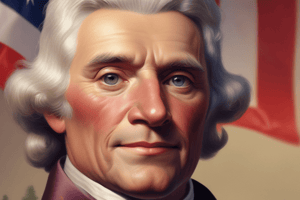Podcast
Questions and Answers
Thomas Jefferson appointed John Marshall as Chief Justice of the Supreme Court.
Thomas Jefferson appointed John Marshall as Chief Justice of the Supreme Court.
True (A)
The Embargo Act of 1807 was designed to promote American trade with Britain and France.
The Embargo Act of 1807 was designed to promote American trade with Britain and France.
False (B)
Jefferson lifted the embargo he established in 1809 because it was proving to be more beneficial than detrimental to the United States.
Jefferson lifted the embargo he established in 1809 because it was proving to be more beneficial than detrimental to the United States.
False (B)
Thomas Jefferson became a widower after his wife, Martha, passed away in 1782.
Thomas Jefferson became a widower after his wife, Martha, passed away in 1782.
Two of Thomas Jefferson's six children died in infancy.
Two of Thomas Jefferson's six children died in infancy.
Martha Jefferson was known to be Thomas Jefferson's confidante during his presidency.
Martha Jefferson was known to be Thomas Jefferson's confidante during his presidency.
Thomas Jefferson was the fourth President of the United States.
Thomas Jefferson was the fourth President of the United States.
The Louisiana Purchase occurred during Thomas Jefferson's presidency.
The Louisiana Purchase occurred during Thomas Jefferson's presidency.
The U.S. Senate did not approve the $15 million cost of the Louisiana Purchase.
The U.S. Senate did not approve the $15 million cost of the Louisiana Purchase.
Thomas Jefferson appointed George Washington as governor of the Northwest Territory to deal with Native American tribes.
Thomas Jefferson appointed George Washington as governor of the Northwest Territory to deal with Native American tribes.
The Battle of Tippecanoe resulted in a defeat for the Native American tribes against Harrison's force.
The Battle of Tippecanoe resulted in a defeat for the Native American tribes against Harrison's force.
Jefferson's naval force under Commodore Stephen Decatur was sent to bombard European cities to deter attacks on American ships.
Jefferson's naval force under Commodore Stephen Decatur was sent to bombard European cities to deter attacks on American ships.
Flashcards are hidden until you start studying
Study Notes
Thomas Jefferson, the third President of the United States, served from 1801 to 1809. His presidency was marked by several significant events and policies.
One of the most notable achievements during Jefferson's presidency was the Louisiana Purchase in 1803. This single event nearly doubled the size of the United States, extending its territory from the Atlantic to the Pacific coast. The purchase cost the United States $15 million, an amount that the U.S. Senate unanimously approved. The Louisiana territory included over 820,000 square miles, which are now 15 U.S. states.
Jefferson also faced challenges from Native American tribes, who were being pushed out of their lands by settlers. He appointed William Henry Harrison, a U.S. army officer, as governor of the Northwest Territory to deal with the Native Americans. Harrison's force was defeated at the Battle of Tippecanoe, but this event eventually led to the signing of the Treaty of Fort Wayne, which gave the United States more control over the region.
During Jefferson's second term, he faced a serious threat from the Barbary pirates. These pirates were located in North Africa and had been harassing American ships for years. Jefferson sent a naval force under Commodore Stephen Decatur to bombard the Barbary pirates' cities to deter further attacks on American ships. The mission was successful, and the United States signed a treaty with the Barbary States, ensuring safe passage for American ships.
Jefferson's presidency was also marked by his support for the Second Bank of the United States. He saw the bank as a necessary institution for the growth of the economy. He also appointed John Marshall as Chief Justice of the Supreme Court, who would later become known for his strong opinions on the Constitution and its rights.
In terms of foreign policy, Jefferson continued the embargo policy that had been established by his predecessor, George Washington. The Embargo Act of 1807 was designed to punish Britain and France for their hostilities against each other, but it had the unintended effect of hurting American trade. Jefferson eventually lifted the embargo in 1809, as its effects on the United States were becoming more detrimental than beneficial.
Jefferson's presidency was also notable for his personal life. He was a widower when he took office, having lost his wife, Martha, in 1782. He had six children, two of whom died in infancy. His relationship with his daughter, Martha, was particularly close. She lived with him in the White House and was known to be his confidante.
In summary, Jefferson's presidency was marked by his successful acquisition of the Louisiana territory, his handling of Native American conflicts, his naval victory against the Barbary pirates, his support for the Second Bank of the United States, and his foreign policy decisions, including the embargo. His personal life, particularly his relationship with his daughter, also played a role during his time in the White House.
Studying That Suits You
Use AI to generate personalized quizzes and flashcards to suit your learning preferences.




